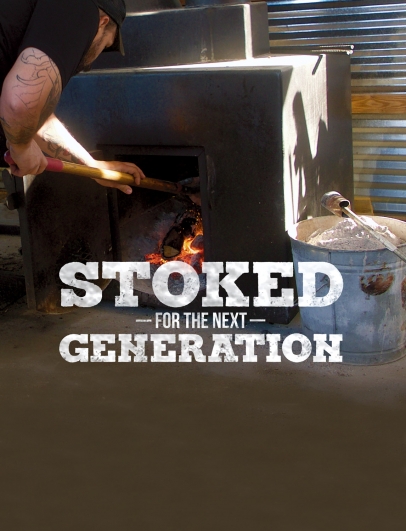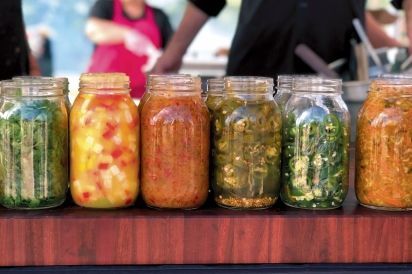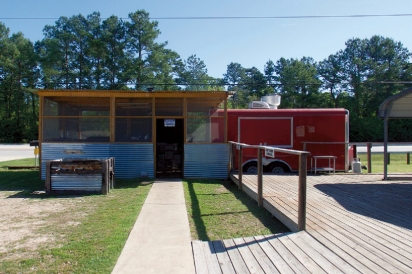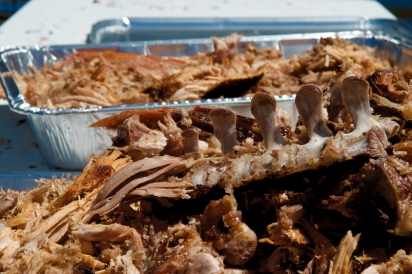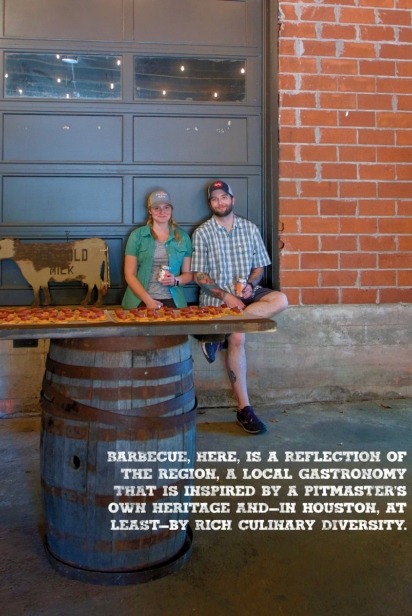Houston Pitmasters Take BBQ To Delicious New Heights
Fresh approaches take Texas barbecue on beyond “The Trinity”
“And do you wrap that in a slice of white bread?” Daniel Vaughn, Texas Monthly’s barbecue editor, (in jest) asked Esaul Ramos, owner and pitmaster of 2M Smokehouse in San Antonio, in a panel discussion at the 2019 Foodways Texas symposium. Ramos was talking about a sausage he makes (using serrano peppers and Oaxaca cheese) and the conversation spun about authenticity versus inventiveness, about cooking what you grew up with versus staples in Texas barbecue— like white bread.
“No,” Ramos replied. “I serve that with house-made tortillas.”
The Texas tradition of serving smoked meats with complimentary white bread, onions and pickles goes back to the 1800s, when local meat companies began offering smoked meats as part of their business. Rather than put time and effort into making batches of coleslaw and baked beans, they offered these three condiments to encourage people to buy and eat that smoked sausage.
As a European transplant (who grew up with “barbecue” meaning the charcoal grill itself, dusted off on summer days for a boatload of kebabs), I didn’t know about a trinity of brisket, ribs and sausage—or the tradition of free white bread, onion and pickles with those meats—until I came to Texas. I dove headfirst into Houston’s barbecue scene, where creativity and daring run alongside traditional trinity.
Offerings at the Houston BBQ Festival this past April tell all— from Gatlin’s porchetta with Cuban rice and smoked ribeye with Chinese five-spice rub, to El Burro & The Bull’s smoked pork and pineapple pibil tacos, to Southern Q’s smoked Caribbean jerk chicken wings with spicy ranch dressing, to Blood Brothers’ togarashi pulled beef with drunken onions and pickled apple. Still, I also learned that in Texas there will always be brisket. That unwieldy tough cut of beef is in and of itself a Texas barbecue tradition, simply seasoned with salt and pepper and smoked for up to 16 hours until tender and juicy (although, “simple” is deceptive: It comes down to a very specific blend of pepper in a range of coarseness—some cracked, some ground—and kosher salt).
Texas barbecue is all about the smoke, maintaining the wood-fueled fire and cooking the meat low and slow. But it means so much more than a cooking method.
Barbecue, here, is a reflection of the region, a local gastronomy that is inspired by a pitmaster’s own heritage and—in Houston, at least— by rich culinary diversity. It is also about community, brotherhood, family. And for some, it is literally about family: being part of the barbecue family and raising one.
WAKE UP AND SMELL BARBECUE
When I turn in to the huge grassy lot that houses Reveille Barbecue Co. in Magnolia at 9am, Wade Elkins has been up for hours, tending to the fire, cleaning and seasoning briskets. It’s not a hot day, early April, but it’s certainly hot inside the hut where the 500-gallon Evie Mae’s reverse-flow smoker is doing its low-and-slow job. “All I need is a mat and I am set for hot yoga,” he jokes.
The mesh-windowed smoking cabin on the edge of the property facing the road is attached to a kitchen trailer. It has a service window that opens to the covered seating area with picnic benches and the grassy area beyond. Elkins lives on the property with his wife, Kathy, and their two young girls, Marley (5) and Ellie (3). It’s paradise for the kids, with all of two acres to roam, catch lizards and play. And for the parents: The high-school sweethearts value their young family life above all else. It’s a dream come true to be his own boss, back in Magnolia where he grew up, a quarter mile down the road. “I just love it out here. I love the country life.”
As he says it, a big truck thunders past, drowning out his voice. We both laugh, and he continues: “It’s that balance between family and work that is so hard to get in this line of business.”
In March Elkins became co-owner of Reveille, along with James McFarland, who works in oil and gas, and Michael Michna, U.S. Marine Corps veteran and Houston firefighter. They showed him how to operate the reverse-flow smoker, and then left him in charge. He is the full-time pitmaster now, flanked by McFarland and Michna on the weekends. Kathy, executive chef at Woodforest Grille, joins him when she can, making pickles, cabbage marmalade or desserts incorporating seasonal fruits.
“James is a beer nerd and uses the hops and the beer to make sausage,” says Elkins. Lone Pint Brewery is just down the road, and McFarland works their IPA into the signature Yellow Rose Sausage. Michna is responsible for another of Reveille’s distinctive sausages: an all-beef taco sausage made with, among other things, jalapeño, cheddar cheese and cilantro.
“There are a lot of people doing barbecue very well, so what is the next step?” says Elkins. “For me, that is applying the techniques to different products. Playing around with stuff, constantly trying out things on the pit, what you can get smoke flavor in, and how.” Think cold-smoked egg yolks, for his version of aviator salad, or cheddar that goes in the smoked cheddar grits.
Once a month they will do a whole hog, sourced from either Black Hill Ranch, or Whitehurst Farm, and, for fans of a true “other white meat,” alligator, sourced from Louisiana. The first time we ever had gator, fried and stuffed in a po’ boy, my son commented that it “tastes like chicken that had shrimp.” Elkins agrees. “You can tell it came from the water.” The alligator smokes low and slow all night, its tasty tender meat pulled the next morning—and sells out in no time.
Between the whole hog, alligator, meats like pork belly, or bone marrow, Elkins asserts one thing will never change: “We will always do the trinity,” because letting go of that would be losing track of the roots of Texas barbecue.
DOUBLE THE LOVE
“People are really enjoying barbecue right now. It is more than a moment. I think it is established at a new level,” says Erin Smith. “People are honing in on their own special style.”
In 2018, underground barbecue took on a new meaning when Feges BBQ opened in a swanky food court in the Greenway Plaza. There is no “following the smoke” here unless you are walking on Edloe and happen to pass by where the hood vent exhales, 200 feet from Feges’ kitchen—a pretty hefty investment that allowed Feges to cook on a wood-fired rotisserie Oyler inside an office building.
The original plan—a full-service barbecue restaurant—went temporarily to the back burner as husband and wife Patrick Feges and Erin Smith grew their team and garnered a steady daily customer base of office workers lining up for their barbecue—and for the sides.
“We have [quite a few] nontraditional sides,” says Smith, and if they got some flak for it initially, it was remedied quickly with growing popularity for sides like the crushed cucumber salad, the spicy and sweet sprouts, and the carrots, cooked on the flattop and seasoned with a Moroccan spice blend. Houston’s seasons come into play, too, with lighter sides when it is hot, and heartier ones when it’s not.
That said, the customary (and complimentary) pickles, onion and bread are part of the offerings. “We go through a lot of bread,” she says. “For a while we offered cornbread as a side, and people got upset when we didn’t offer that complimentary.” I think of the cornbread they served at one of their catered events, licked with smoked hog fat and dusted with jalapeño powder. But Smith explains why she supports the white bread tradition. “It is symbolic. It is a simple thing, but so much part of our own barbecue experiences.”
The couple brings quite the culinary pedigree to the smoker. He is a graduate from Le Cordon Bleu in Austin, and worked among others at Underbelly, Brennan’s and Killen’s. She is a graduate from the California Culinary Academy in San Francisco, and cut her teeth at Per Se in New York. She’s also a “Chopped” champion. When she talks about how husband Patrick developed his passion for barbecue, her voice softens. Patrick, she tells me, is a purple heart recipient. He was injured in Iraq, and was in recovery for several months. In the hospital, he met a guy who had a smoker that he was giving away. He gave it to Patrick. And when Patrick was out of the hospital, he smoked his first brisket.
“That first brisket sold him on barbecue. It became a hobby, and barbecue was the thing that pushed him to get back into the culinary world.”
For a young family (baby Wyatt was born in January), it’s a family-friendly business to run. “Totally, 100%,” says Smith. “We’re up at 4am, and I’m done with work by 3–4pm. I get to take advantage of the daylight hours with my son.” Oddly enough, it is the smoker they use that helps with that family-work balance. The Oyler, a product of J&R Manufacturing in Mesquite, Texas, is built to maintain a fire, unattended, for up to 14 hours. “It has a firebox that keeps going overnight because of its cylindrical tightness. If the temperature drops, there is a heating element on it so that it keeps on cooking. It helps us sleep at night. And the first one that gets here, at 5am, first checks on the firebox.”
Family life is also what drives their search for a new location, the one that will be that full-service barbecue restaurant. “We are hoping to make a family restaurant where our kids become part of the restaurant. It depends on what [they] want. Some kids love to be around mom and dad when they’re working. Some kids don’t. One thing is for sure: We are looking for a place close to home.”
Community matters to them. They each regularly donate time and effort (and barbecue) to fundraising events. Veteran organizations are very important to purple-heart veteran Feges. For Smith, co-founder of the nonprofit I’ll Have What She’s Having, which focuses on women’s welfare, it is women’s empowerment. “I just want to see women thrive.”
And they count themselves blessed to be part of the barbecue family. Says Smith: “The barbecue community is extremely supportive [of each other]. Competitiveness is friendly and it helps to motivate you to do better and be better. It is a great industry to be in. They are salt-of- the-earth people.”


